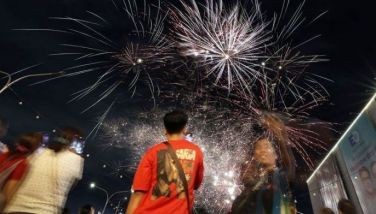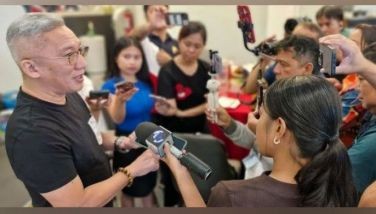Comelec issues guidelines for AFP
February 9, 2007 | 12:00am
The Commission on Elections had issued guidelines for the Armed Forces of the Philippines in maintaining what it called honest, orderly and peaceful elections (HOPE) on May 14.
AFP Central Command spokesperson Lt. Col. Jefferson Omandam Omandam said they have already received the guidelines, which stated that soldiers should only concentrate on areas where there are serious armed threats.
Omandam said army units in the fields are now closely coordinating with the Philippine National Police to strictly implement the Comelec's gun ban.
Omandam said achieving peace and order during the election period is a united effort among Comelec, police and the military although the AFP's role is merely in support to the police.
HOPE Task Force commander Sr. Supt. Lani-O Nerez said almost all towns and cities in Central Visayas have checkpoints to ensure the strict enforcement of the gun ban, which took effect last January 14.
Nerez, who is also the deputy director for operations of the regional police, said he had ordered all provincial, city and municipal police stations to create their own reaction units that will coordinate with the election officers in their respective areas.
The reaction units' purpose is to respond to any poll-related concerns in their areas of jurisdiction.
After last Monday's close-door conference by top officials from police, Comelec and from other deputized agencies such as the military, at least 39 towns and cities in Central Visayas have been identified as possible 'areas of concern.'
Of the figure, 14 come from Cebu but Nerez claimed that the identified areas were pinpointed based on their history of election-related violence, intense political rivalry and the strong presence of armed rebels.
Nerez, however, clarified that unless all the local candidates have already filed their certificates of candidacy, the police cannot yet finalize the list of the hot spots in the region.
The police have continued to assess and evaluate possible hot spots in the region before coming up with the final list of 'areas of concern,' Nerez said.
Military personnel will be deployed in places considered as 'areas of concern' or hot spots and will help police enforce the gun ban. - Gregg M. Rubio/LPM
AFP Central Command spokesperson Lt. Col. Jefferson Omandam Omandam said they have already received the guidelines, which stated that soldiers should only concentrate on areas where there are serious armed threats.
Omandam said army units in the fields are now closely coordinating with the Philippine National Police to strictly implement the Comelec's gun ban.
Omandam said achieving peace and order during the election period is a united effort among Comelec, police and the military although the AFP's role is merely in support to the police.
HOPE Task Force commander Sr. Supt. Lani-O Nerez said almost all towns and cities in Central Visayas have checkpoints to ensure the strict enforcement of the gun ban, which took effect last January 14.
Nerez, who is also the deputy director for operations of the regional police, said he had ordered all provincial, city and municipal police stations to create their own reaction units that will coordinate with the election officers in their respective areas.
The reaction units' purpose is to respond to any poll-related concerns in their areas of jurisdiction.
After last Monday's close-door conference by top officials from police, Comelec and from other deputized agencies such as the military, at least 39 towns and cities in Central Visayas have been identified as possible 'areas of concern.'
Of the figure, 14 come from Cebu but Nerez claimed that the identified areas were pinpointed based on their history of election-related violence, intense political rivalry and the strong presence of armed rebels.
Nerez, however, clarified that unless all the local candidates have already filed their certificates of candidacy, the police cannot yet finalize the list of the hot spots in the region.
The police have continued to assess and evaluate possible hot spots in the region before coming up with the final list of 'areas of concern,' Nerez said.
Military personnel will be deployed in places considered as 'areas of concern' or hot spots and will help police enforce the gun ban. - Gregg M. Rubio/LPM
BrandSpace Articles
<
>
- Latest
- Trending
Trending
Latest





















